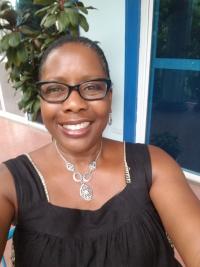Kimberly Nettles-Barcelón
Faculty Director of the Center for the Advancement of Multicultural Perspectives in the Social Sciences, Arts and Humanities in Academic Diversity (DEI) and Associate Professor in the Gender, Sexuality and Women’s Studies Program

As the Faculty Director of CAMPSSAH I work to support the recruitment and retention of faculty (BIPOC, URM, and allies) whose research, teaching and service align with the DEI mission. Newly hired faculty are nominated to become CAMPSSAH Scholars by the Dean’s Office in consultation with Department Chairs. We select CAMPSSAH scholars based on their past documented efforts to diversify the academy through their research, mentoring, community work, and teaching. I am also the PI of an AFD Grant “Professors Leveraging a Community of Engagement” (P.L.A.C.E.) which is a two-year pilot project aimed to improve the lived experiences of and provide resources to Associate Professors at UC Davis. P.L.A.C.E. includes several initiatives designed to support this population – featuring Writing Communities, Book Manuscript Workshops, Post-Tenure Start-Up Packages, and Scholar of the Quarter awards.
Why I Do DEI Work
My current work in DEI stems directly from my experiences as a longtime Associate Professor at UC Davis. When I learned of the COACHE Survey finding that Associate Professors report the least satisfaction with their jobs at UC Davis, I realized that it was time to put my experiences in service to improving the climate and culture of UC Davis for the faculty who do DEI work every day – in and out of the classroom. Having the honor to serve as the inaugural Faculty Director of CAMPSSAH is a focused engagement in the principles of DEI that I have always been active in as a scholar, teacher and mentor. Indeed, I entered graduate school at UCLA in the early 1990s as a Project 88 Scholar – an “old school” affirmative action program geared toward first generation graduate students from underrepresented minority groups. While I was in graduate school, the UC Regents passed Proposition 209 that eliminated the ability to consider race as a category of identity in student admissions, faculty recruitment, and other outreach efforts to create a more diverse campus community. The result of Proposition 209 was a dramatic and sudden decrease in the numbers of Black students falling from 693 in 1995 to 99 in 2006 (Source: https://newsletter.alumni.ucla.edu/connect/2020/march/ucla-in-the-1990s/default.htm). It had similar effects on the numbers of Black, Latinx, Native and Asian Pacific Islander faculty as well, which we all felt as graduate students seeking faculty of color to guide us through graduate school and into the profession. Many of my graduate school comrades took up the task of providing spaces to affirm first generation, immigrant, and students of color and to help them/us succeed in the university. We were TAs in the Freshmen Summer Program, ran identity-based groups (e.g., The Mexican American Study Project), and developed curriculum like the “Women of Color in the U.S.” course which we taught collectively. This ethos has shaped my career as faculty person – particularly as I have engaged with undergraduate students. I see my role with CAMPSSAH as a way to pivot in this stage of my career to focus on improving the lived experiences of faculty who (with very few resources) continue the good fight. And, to agitate in whatever way I can to increase our presence on this campus and in the UC system.
Motto/Hashtag
“peace. It does not mean to be in a place where there is no noise, trouble or hard work. it means to be in the midst of those things and still be calm in your heart.” (author unknown)
Social Media
I am not on social media … yet! But these are spaces that speak to me: Cite Black Women. @citeblackwomen; CiteBlackWomenCollective
Last updated March 3, 2021

